六年级下册形容词的比较级和最高级
常见形容词比较级最高级变化一览表
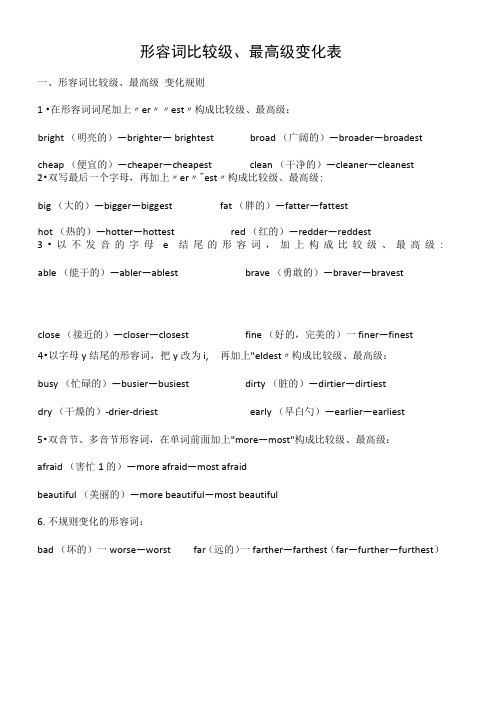
形容词比较级、最高级变化表一、形容词比较级、最高级变化规则1 •在形容词词尾加上〃er〃〃est〃构成比较级、最高级:bright (明亮的)—brighter— brightest broad (广阔的)—broader—broadest cheap (便宜的)—cheaper—cheapest clean (干净的)—cleaner—cleanest2•双写最后一个字母,再加上〃er〃"est〃构成比较级、最高级:big (大的)—bigger—biggest fat (胖的)—fatter—fattesthot (热的)—hotter—hottest red (红的)—redder—reddest3•以不发音的字母e结尾的形容词,加上构成比较级、最高级: able (能干的)—abler—ablest brave (勇敢的)—braver—bravestclose (接近的)—closer—closest fine (好的,完美的)一finer—finest4•以字母y结尾的形容词,把y改为i,再加上"eldest〃构成比较级、最高级:busy (忙碌的)—busier—busiest dirty (脏的)—dirtier—dirtiestdry (干燥的)-drier-driest early (早白勺)—earlier—earliest5•双音节、多音节形容词,在单词前面加上"more—most"构成比较级、最高级:afraid (害忙1 的)—more afraid—most afraidbeautiful (美丽的)—more beautiful—most beautiful6.不规则变化的形容词:bad (坏的)一worse—worst far (远的)一farther—farthest (far—further—furthest)二、形容词比较级和最髙级句型(特殊)比较级句型:[•在形容词比较级前还可以用much, even, still, a little,……来修饰,表示"……的多甚至 "更U---------------------- 些〃OOur city is much more beaut讦ul than yours・我们的城市比你们的漂亮得多。
六年级中的常见比较级与最高级用法归纳

六年级中的常见比较级与最高级用法归纳在英语学习中,掌握比较级和最高级的用法是十分重要的。
在六年级中,同学们需要掌握一些常见的比较级和最高级的用法,以便能够更好地运用这些语法知识。
本文将对六年级中的常见比较级和最高级用法进行归纳总结,并提供一些例句供参考。
一、形容词和副词的比较级和最高级用法1. 形容词的比较级和最高级形容词的比较级表示两者之间的比较,最高级表示三者或三者以上的比较。
常见的构造方式是在形容词后加"er"或"est",或在形容词前加"more"或"most"。
- 比较级例句:He is taller than his sister.- 最高级例句:She is the tallest girl in her class.2. 副词的比较级和最高级副词的比较级和最高级用法与形容词类似,也是在副词后加"er"或"est",或在副词前加"more"或"most"。
- 比较级例句:He runs faster than his friends.- 最高级例句:She speaks English the most fluently in the group.二、名词的比较级和最高级用法1. 单音节名词的比较级和最高级单音节名词的比较级和最高级的构造方式与形容词相同,即在名词前加"er"或"est",或在名词前加"more"或"most"。
- 比较级例句:This is a bigger apple than that one.- 最高级例句:It is the tallest tree in the park.2. 多音节名词的比较级和最高级多音节名词前要加上"more"或"most"来构造比较级和最高级,不能使用"er"或"est"。
人教版六年级下册知识点归纳比较级与最高级的形成与用法
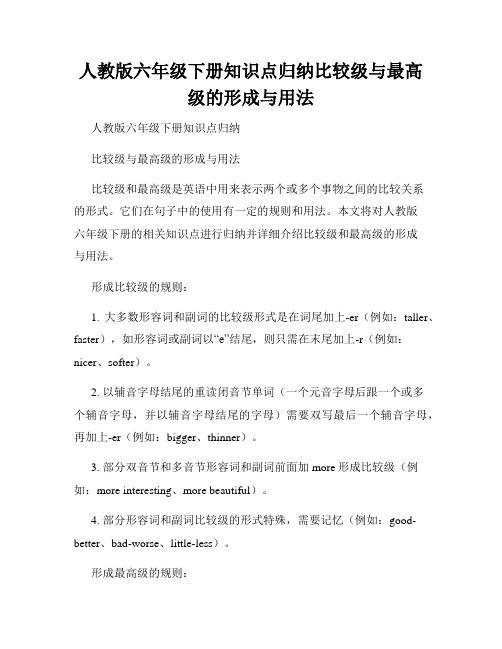
人教版六年级下册知识点归纳比较级与最高级的形成与用法人教版六年级下册知识点归纳比较级与最高级的形成与用法比较级和最高级是英语中用来表示两个或多个事物之间的比较关系的形式。
它们在句子中的使用有一定的规则和用法。
本文将对人教版六年级下册的相关知识点进行归纳并详细介绍比较级和最高级的形成与用法。
形成比较级的规则:1. 大多数形容词和副词的比较级形式是在词尾加上-er(例如:taller、faster),如形容词或副词以“e”结尾,则只需在末尾加上-r(例如:nicer、softer)。
2. 以辅音字母结尾的重读闭音节单词(一个元音字母后跟一个或多个辅音字母,并以辅音字母结尾的字母)需要双写最后一个辅音字母,再加上-er(例如:bigger、thinner)。
3. 部分双音节和多音节形容词和副词前面加more形成比较级(例如:more interesting、more beautiful)。
4. 部分形容词和副词比较级的形式特殊,需要记忆(例如:good-better、bad-worse、little-less)。
形成最高级的规则:1. 大多数形容词和副词的最高级形式是在词尾加上-est(例如:tallest、fastest),如形容词或副词以“e”结尾,则只需在末尾加上-st(例如:nicest、softest)。
2. 以辅音字母结尾的重读闭音节单词需要双写最后一个辅音字母,再加上-est(例如:biggest、thinnest)。
3. 部分双音节和多音节形容词和副词前面加most形成最高级(例如:most interesting、most beautiful)。
4. 部分形容词和副词最高级的形式特殊,需要记忆(例如:good-best、bad-worst、little-least)。
在比较级和最高级的使用中,我们需要注意以下几点:1. 当两个人或物进行比较时,我们使用比较级。
例如:“He is taller than his brother.”2. 当三个或三个以上的人或物进行比较时,我们使用最高级。
形容词副词的比较级和最高级与用法
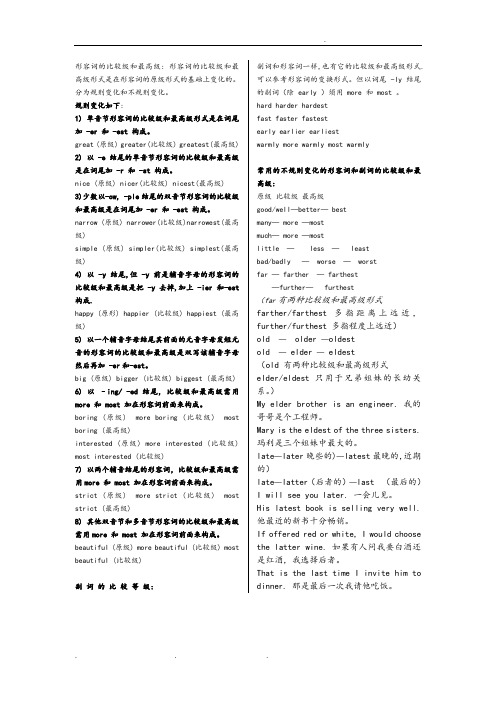
形容词的比较级和最高级: 形容词的比较级和最高级形式是在形容词的原级形式的基础上变化的。
分为规则变化和不规则变化。
规则变化如下:1) 单音节形容词的比较级和最高级形式是在词尾加 -er 和 -est 构成。
great (原级) greater(比较级) greatest(最高级) 2) 以 -e 结尾的单音节形容词的比较级和最高级是在词尾加 -r 和 -st 构成。
nice (原级) nicer(比较级) nicest(最高级)3)少数以-ow, -ple结尾的双音节形容词的比较级和最高级是在词尾加 -er 和 -est 构成。
narrow (原级) narrower(比较级)narrowest(最高级)simple (原级) simpler(比较级) simplest(最高级)4) 以 -y 结尾,但 -y 前是辅音字母的形容词的比较级和最高级是把 -y 去掉,加上 -ier 和-est 构成.happy (原形) happier (比较级) happiest (最高级)5) 以一个辅音字母结尾其前面的元音字母发短元音的形容词的比较级和最高级是双写该辅音字母然后再加 -er和-est。
big (原级) bigger (比较级) biggest (最高级) 6) 以–ing/ -ed结尾, 比较级和最高级需用more 和 most 加在形容词前面来构成。
boring (原级) more boring (比较级) most boring (最高级)interested (原级) more interested (比较级) most interested (比较级)7) 以两个辅音结尾的形容词,比较级和最高级需用more 和 most 加在形容词前面来构成。
strict (原级) more strict (比较级) most strict (最高级)8) 其他双音节和多音节形容词的比较级和最高级需用more 和 most 加在形容词前面来构成。
英语人教版六年级下册比较级和最高级
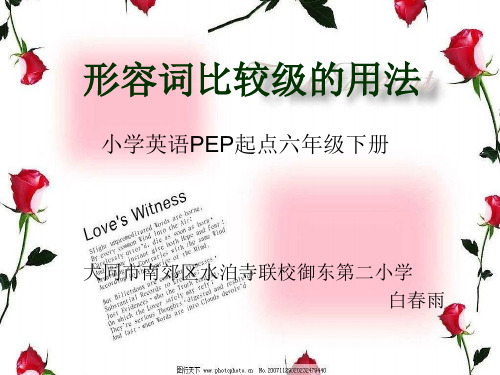
客运站安全生产教育制度1. 前言为了保障客运站工作人员安全生产,确保旅客乘车安全,促进客运行业的健康进展,特订立本客运站安全生产教育制度。
2. 教育内容2.1 总体要求客运站应依据自身安全生产和管理的实际情况,在本制度的引导下,加强本职工作的安全意识,提高安全操作本领,遵守国家、行业和单位安全生产规定和制度,削减安全事故的发生。
2.2 安全标准客运站应建立相应的安全标准、操作规范,加强安全检查和教育培训,促进安全生产责任制的落实。
并应依据安全标准和实际情况,建立和完善各项安全防护措施,如消防、防爆、防盗、防雷等措施,以保障安全生产。
2.3 安全设施客运站应建立和完善安全设施,做到防范、防备和应急处理,并订立相应的应急预案,适时处置各类安全事件,最大限度地削减安全事故的损失,确保旅客和员工的生命安全。
2.4 安全培训客运站应定期开展安全教育和培训,包括但不限于:安全规定、操作技能、应急处理等方面的学问和技能培训。
对工作人员进行必要的考核,并签订安全生产责任书,强化安全生产责任意识。
2.5 安全检查客运站应当对安全生产各方面进行关键检查,包括但不限于设备的完好性,人员的安全操作技能,应急处理程序的完善性等方面。
针对检查中发觉的问题,要适时做出改正和整改。
3. 安全生产教育的实在措施3.1 定期组织安全生产培训和考试客运站应当定期组织安全生产培训和考试,对不符合安全规定和标准的人员进行反复培训和考试,直至合格为止。
3.2 编制应急预案和演习客运站应当订立并不断完善应急预案,包括应急物资准备、应急人员组织、安全疏散等方面,并定期组织演习,以确保应急处置的专业化、标准化、协调性。
3.3 建立安全记录档案客运站应建立安全生产记录档案,包括设备情况、安全检查记录、重要负责人签字、员工培训、安全责任书等内容,以保留安全生产过程中的紧要数据和信息,为日后改进工作供给牢靠依据和参考。
3.4 管理各项安全监控设备客运站应管理好各项安全监控设备,定期检查,保持设备的完好和正常运行,对检查发觉的问题要适时整改或更换。
小学六年级常用形容词的比较级与最高级用法归纳
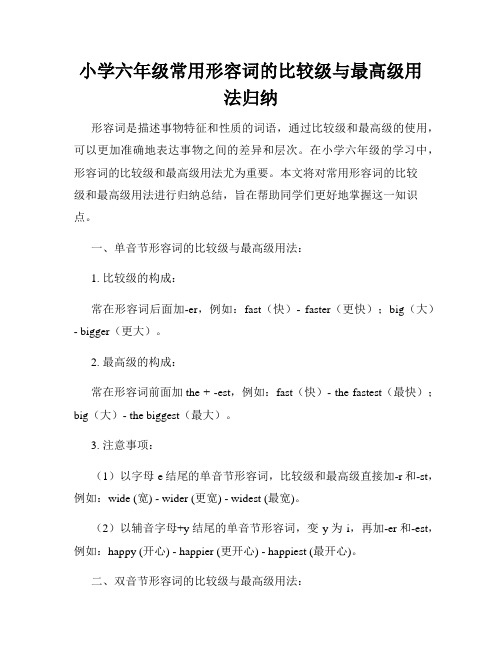
小学六年级常用形容词的比较级与最高级用法归纳形容词是描述事物特征和性质的词语,通过比较级和最高级的使用,可以更加准确地表达事物之间的差异和层次。
在小学六年级的学习中,形容词的比较级和最高级用法尤为重要。
本文将对常用形容词的比较级和最高级用法进行归纳总结,旨在帮助同学们更好地掌握这一知识点。
一、单音节形容词的比较级与最高级用法:1. 比较级的构成:常在形容词后面加-er,例如:fast(快)- faster(更快);big(大)- bigger(更大)。
2. 最高级的构成:常在形容词前面加the + -est,例如:fast(快)- the fastest(最快);big(大)- the biggest(最大)。
3. 注意事项:(1)以字母e结尾的单音节形容词,比较级和最高级直接加-r和-st,例如:wide (宽) - wider (更宽) - widest (最宽)。
(2)以辅音字母+y结尾的单音节形容词,变y为i,再加-er和-est,例如:happy (开心) - happier (更开心) - happiest (最开心)。
二、双音节形容词的比较级与最高级用法:1. 比较级的构成:在形容词前面加more,例如:careful(小心的)- more careful(更小心的)。
2. 最高级的构成:在形容词前面加the most,例如:careful(小心的)- the most careful(最小心的)。
3. 注意事项:有些双音节形容词可以同时使用-er和-est的构成方式,例如:clever(聪明的)- cleverer/cleverest。
三、部分常用形容词的比较级与最高级用法:1. good(好)- better(更好)- the best(最好)例句:Tom is a good student, but his brother is even better.(汤姆是一个好学生,但他的哥哥更好。
l六下小学英语形容词比较级最高级重点讲解及练习
A.形容词的比较级和最高级变化规则B.部分双音节与多音节的词比较级在原级之前加more, 最高级在原级之前加most beautiful---more beautiful---most beautifulinteresting---difficult---C.不规则变化的形容词:little / few(原形)- less (比较级)- least(最高级)good(原形)- better(比较级)- best(最高级)bad (原形)- worse(比较级)- worst(最高级)far (原形)-- further—furthest形容词比较级句型:主语A+be动词+形容词比较级+than+B A比B……例句:I’m taller than you. 我比你高。
形容词最高级句型:主语+be+(one of )the +形容词最高级+名词复数+in/of短语表示……是……中,最……之一。
例句:Beijing is one of the largest cities in China. 北京是中国最大的城市之一。
写出以下各形容词的比较级和最高级:1. nice ______________________2. fat ____________________3. slow _____________________4. dry ____________________5. happy ____________________6. wet ____________________7. much ____________________ 8. ill _____________________9. little _____________________ 10. bad ___________________11. thin ______________________ 12. far ____________________13. early _____________________ 14. careful_________________15. exciting ___________________ 16. busy __________________2. 根据句意,用所括号内所级形容词的比较等级形式填空:1. Mr. Smith is _________ man in this office. (rich)2. Winter is _________ season of the years. (cold)4. It is much _______ today than yesterday. (hot)5. She is a little ________ than her classmates. (careful)6. ________ people came to the meeting than last time. (many)7. Which book is ________, this one or that one? (easy)8. My room is _______ than yours. (small)9. Hainan is _______ from Beijing than Hunan. (far)10. Skating is _______ than swimming. (exciting)11. Jim is _______ than all the others. (honest)12. Things are getting _______ and _______. (bad)13. The higher you climb, the _______ it will be. (cold)14. Now his life is becoming ________ and _______. (difficult)用适当形式填空:1. Bob is _________ ( young ) than Fred. but ___________ (tall) than Fred.2. Almost all the students' faces are the same ,but Li Deming looks _______ (fat) than before after the summer holidays.3.Which is _________ (heavy), a duck or a chicken?5.-- How _________ (tall) is Sally?--She' s 1.55 metres ________ (tall). What about Xiaoling? -- She' s only 1.40 metres ________ (tall).She is much _______ (short) than Sally.She is also the _______ (short) girl in the class.6. He is ______ (bad) at learning maths. He is much _______ (bad) at Chinese and he is the _________ (bad) at English.7. Annie says Sally is the ________ (kind) person in the world.8. He is one of the_________(friendly) people in the class, I think.9. A dictionary is much _________ (expensive) than a story-book.10. An orange ia a little ______ (big) than an apple, but much ________ (small) than a watermelon.11. The Changjiang River is the _______ (long) river in China.12. Sue is a little ___________ (beautiful) than her sister.14.--How difficult is physics?--I' m not sure.-- Is it ________ (difficult) than maths?-- I don' t think so.15.-- Annie plays the piano very ___________ (well).-- Sue plays it _____ (well) than Annie.And Sally plays it the __________ (well).16. Saturday is my _________ (busy) day in a week.17. Her mother is getting ____________(fat) and ________ (fat).18. I think it' s too expensive. I' d like a _____________ (cheap) one.19. He comes to school much ____________ (early) than I.21. Your classroom is __________(wide)and ___________(bright) than ours.22. Practise as __________ (much) as you can.23. The ________ (much), the ____________ (good).24. Nowadays(现在) English is __________( important )than any other subject, 1 think.。
形容词及副词的比较级和最高级
形容词的比较级及最高级1:单音节词,在词尾加er构成比较级,加est构成最高级。
tall-- taller --tallest kind-kinder-kindest tall-taller-tallestgreat--greater --greatest slow-slower-slowest cold-colder-coldest long—longer—longest quick-quicker-quickest dear-dearer-dearer small—smaller—smallest cheap-cheaper-cheapest warm-warmer-warmest short—shorter—shortest calm-calmer-calmest wild-wilder-wildest new—newer—newest old—older—oldest quiet-quieter-quietest weak—weaker—weakest srong-stronger-strongest near-nearer-nearest clean—cleaner—cleanest dull-duller-dullest loud-louder-loudest low—lower—lowest high-higher-highest rich-richer-richestpoor-poorer-poorest bright--brighter—brightest clever-cleverer-cleverestdark-darker-darkest smart-smarter-smartest poor-poorer-poorestexcited-exciteder-excitedest cool-cooler-coolest clear-clearer-clearestfew-fewer-fewest2:以不发音的e结尾,直接在词的后面加r构成比较级,加st构成最高级nice-- nicer --nicest free-freer-freest safe-safer-safest fine—finer—finestlarge– larger-- largest close-closer-closest wide-wider-widest cute—cuter—cutest white—whiter—whitest late—later—latest3: 重读闭音节词,双写结尾的辅音字母, 再加er构成比较级,加est构成最高级。
小学六年级常用形容词的比较级与最高级用法总结
小学六年级常用形容词的比较级与最高级用法总结形容词是我们日常中常用的词汇之一,它能够描述人、事物的特征或状态。
在学习英语的过程中,我们经常使用形容词的比较级和最高级来对事物进行比较或者表达最高程度。
下面是小学六年级常用形容词的比较级与最高级用法总结,希望能帮助同学们更好地掌握相关知识。
1. 比较级的构成方法比较级用于对两个人或事物进行比较,构成方式有两种:1) 一个音节及多音节词:比较级加-er,例如:taller(更高的)、stronger(更强壮的)、smarter(更聪明的)。
辅音字母+y结尾,变y为i再加-er,例如: happier(更快乐的)、funnier(更有趣的)。
以“字母e”结尾的词,直接加-r,例如:nicer(更好的),braver (更勇敢的)。
2) 以辅音字母结尾的重读闭音节词,需双写辅音字母再加-er,例如:bigger(更大的)、thinner(更瘦的)。
2. 最高级的构成方法最高级用于对三者或以上进行比较,构成方式也分为两种:1) 一个音节及多音节词:最高级加-est,例如:tallest(最高的)、strongest(最强壮的)、smartest(最聪明的)。
以“字母e”结尾的词,直接加-st,例如:nicest(最好的)、bravest(最勇敢的)。
2) 以辅音字母结尾的重读闭音节词,需双写辅音字母再加-est,例如:biggest(最大的)、thinnest(最瘦的)。
3. 比较级和最高级的用法比较级和最高级的使用要根据具体的语境和需求,以下是几种常见的用法:1) 比较级的用法:a. 表示两者之间的比较,例如:My dog is bigger than yours.(我的狗比你的狗大。
)b. 表示动作变得更强烈或程度更高,例如:The music is getting louder and louder.(音乐越来越大声。
)2) 最高级的用法:a. 表示超过三者以上的比较,例如:Among all the students, Jenny is the tallest.(在所有学生中,珍妮是最高的。
形容词的比较级和最高级的变化规则
形容词的比较级和最高级的变化规则在英语学习中,形容词的比较级和最高级是非常重要的语法知识点。
掌握它们的变化规则,对于准确、生动地表达程度和进行比较至关重要。
下面就让我们一起来详细了解一下形容词的比较级和最高级的变化规则。
一般来说,形容词的比较级和最高级的变化规则可以分为以下几种情况:一、单音节词和部分双音节词1、一般在词尾加 er 构成比较级,加 est 构成最高级。
例如:tall(高的) taller tallestshort(矮的) shorter shortest2、以字母 e 结尾的词,直接加 r 构成比较级,加 st 构成最高级。
比如:nice(好的) nicer nicestlarge(大的) larger largest3、重读闭音节词,末尾只有一个辅音字母,应先双写这个辅音字母,再加 er 构成比较级,加 est 构成最高级。
常见的有:big(大的) bigger biggesthot(热的) hotter hottestfat(胖的) fatter fattest4、以“辅音字母+y”结尾的双音节词,先把“y”变为“i”,再加 er 构成比较级,加 est 构成最高级。
举例:easy(容易的) easier easiestheavy(重的) heavier heaviestbusy(忙碌的) busier busiest二、多音节词和部分双音节词对于多音节词和部分双音节词,在词前加 more 构成比较级,加most 构成最高级。
例如:beautiful(美丽的) more beautiful most beautifulimportant(重要的) more important most importantinteresting(有趣的) more interesting most interesting需要注意的是,有些形容词的比较级和最高级是不规则变化的,需要特别记忆。
比如:good(好的) better bestbad(坏的) worse worstmany/much(许多) more mostlittle(少的) less leastfar(远的) farther/further farthest/furthest此外,还有一些形容词本身就有比较级和最高级的形式,无需进行变化。
- 1、下载文档前请自行甄别文档内容的完整性,平台不提供额外的编辑、内容补充、找答案等附加服务。
- 2、"仅部分预览"的文档,不可在线预览部分如存在完整性等问题,可反馈申请退款(可完整预览的文档不适用该条件!)。
- 3、如文档侵犯您的权益,请联系客服反馈,我们会尽快为您处理(人工客服工作时间:9:00-18:30)。
2014广州小学六年级英语下册形容词的比较级和最高级专题训练大多数形容词有三个等级:1.原级,即形容词原形,表示双方程度相同或不同2.比较级,表示“较……”,“更……一些”的意思3.最高级,表示“最……”的意思。
在英语里两个人或物体进行比较时要用比较级。
三个人或三个物体(或三个以上的人和三个以上的物体)进行比较时要用最高级。
如:He is taller than me.他比我高。
His room is bigger than my room. 他的房间比我的房间大。
She is younger than my sister. 她比我妹妹年轻。
He is tallest in our class.他在我们班最高。
形容词的比较级和最高级的构成形容词的用法:一、形容词原级的用法表示双方程度相同(即年龄、高矮等等)或不同时用形容词原级。
肯定式用as……as(和/与……一样)表示;否定式用not as……as或not so……as(和/与……不一样)表示。
as……as的中间用形容词和副词原级。
She is as tall as I.她和我一样高。
Lesson Five is as difficult as Lesson Four.第五课和第四课同样难。
He is not as old as you.他没有你那么老。
Lily is not as careful as Linda.莉莉不如琳达细心。
1.肯定句的句式结构是:A+be动词+as+形容词原级+as+B(表示A、B两者比较程度相同)。
This film is as interesting as that one.这部电影和那部电影一样有趣。
Her handwriting is as good as his.她的书写于他的一样好。
Mary is as careful as Linda.玛丽和琳达同样细心。
2.否定句的句式结构是:A+be动词+not+as+形容词原级+as+B(=A+be动词+not+so+形容词原级+as+B)(表示A、B两者程度不同,即A不如B那么……)Spring is not as/so cold as winter.春天不像冬天那么冷。
This box is not as/so heavy as that one.这个箱子不如那个重。
二、形容词的比较级用法两者(即两个人或物体)进行比较时,用比较级表示,其结构是:主语+连系动词be+形容词比较级+than+对比成分(或从句)Mike is older than Tom.迈克比汤姆老。
It is colder today than (it was) yesterday.今天天气比昨天冷。
The sun is bigger than the earth.太阳比地球大。
注意:than之后的人称代词,在口语中可以用宾格。
如果人称代词之后跟着谓语时,则只能用主格。
He is taller than I/me.=He is taller than I am.他比我高。
than之后常常省去在意义上和主句相同的谓语成分。
Jim is younger than Tom (is).吉姆比汤姆年轻。
Jim has more story-books than Kate.吉姆的故事书比凯特的多。
三、使用比较级应注意的问题1.形容词比较级前可以加程度副词(如:much、far、a lot、a bit、a little、even、still 等)或数量词组修饰,表示“……得多”、“甚至……”、“更……”、“……一些(一点)”China is much larger than Japan.中国比日本大得多。
He is a little/a bit taller than I.他比我略高一点。
Lily is careful,but Lucy is even more careful.莉莉很细心,但露西更细心。
This street is one hundred metres longer than that one.这条街比那条街长一百米。
2.形容词比较级要避免与自身进行比较。
要用“比较级+than any other+单数名词”来表示“比其他的任何……都……”Lin Tao is older than any other student in the class.林涛比班上其他任何同学的年龄都大。
3.有些代形容词比较级的惯用结构:“比较级+and+比较级”,“more and more+形容词”译为“越来越……”“the+比较级+主语+谓语,the+比较级+主语+谓语”译为“越……,就越……”The city is becoming more and more beautiful.这座城市变得越来越美丽。
He ran faster and faster.他跑得越来越快。
His voice got weaker and weaker.他的声音变得越来越弱。
The sooner this is done,the better.这件事做得越快越好。
The harder he tried,the less progress he seemed to make.他越努力尝试,进步好像就越小。
4.形容词比较级也可以用句型“the+比较级+of the two”译为“两个中比较……的”The apple is the bigger of the two.这个苹果是两个中比较大的。
四、形容词最高级的用法表示三者或三者以上的人或事物的比较。
最高级形容词前面要加定冠词the,句末一般跟一个介词短语来说明比较的范围。
其句型是:主语+谓语+the+形容词最高级+(名词)+of(in)……Spring is the best season of the year.春天是一年中最好的季节。
She is the youngest of us all.她是我们所有人中最年轻的。
This question is the most difficult of the three.三个问题中这一个是最难的。
注意:形容词最高级带有物主代词或名词所有格,不能再用定冠词the。
It is my busiest day.这是我最忙的一天。
Of后面应跟复数名词;in后面跟表示范围或场所的名词。
Of all the boys在所有男孩中 in our class在我们班上of all the things在所有东西中 in the world在世界上of us在我们中 in China在中国(之内)of all people在所有人中 in my family在我们家里五、形容词最高级应注意的问题1.形容词最高级前面如果有much、by far等程度副词修饰,它应放在定冠词the的前面。
She is much/by far the best of all students in the class.她是班上最好的学生。
2.形容词最高级前面如果有序数词修饰,它应放在定冠词之后。
Shanghai is the first largest city in China.上海是中国第二大城市。
3.句型“one of the+形容词最高级+……”表示“是最……之一”。
China is one of the largest countries in the world.中国是世界上最大的国家之一。
Yandong is one of the most interesting places in Liping.岩洞是黎平最好玩的地方之一。
4.与most组成的惯用结构:“most+复数名词”,“most of the+复数名词”或“most of+代词”,表示“大多数的”、“大部分的”Most students went to the Great Wall.大多数学生去长城了。
Most of the boys are in the park.大部分的男孩在公园里。
Most of his books were written in English.他的大部分书是用英文写的。
5.形容词最高级可以用原级、比较级、最高级来表示。
最高级 He is the tallest in his class.他是班上个子最高的。
比较级 He is taller than any other student in his class.原级 No other student in his class is as tall as he.六、Who/Which is+形容词比较级和最高级的句型1.表示两者之间选择,问“哪一个较……”或“谁更……”的意思时,用“Who is+形容词比较级,+A or B”或“Which is+形容词比较级,+A or B”的结构。
Who is younger,Mary or Kate?玛丽和凯特谁更年轻?2.表示三者以上选择,问“谁最……”或“什么最……”的意思时,用“Who is the+形容词最高级,+A,B or C (或A,B or C)”或“Which is the+形容词最高级,+A,B or C(或A,B or C)”的结构。
Who is the youngest,Mary,Kate or James?玛丽、凯特和詹姆斯,谁最年轻?Which is the biggest,the sun,the earth or the moon?太阳、地球和月亮,哪一个最大?七、副词的比较级和最高级的用法与形容词基本相同形容词、副词、介词专项训练用所给词的适当形式填空:1.Li Lei is the student in our class. (tall)2.Who runs the in the class? (fast)3.Kate draws in our class. (well)4.My brother is much than you. (young)5.I think my car is as as yours. (nice)6.This box is the of the three. (heavy)7.Lesson One is much than Lesson Two. (easy)8.I think maths is the subject of all. (difficult)9.Winter is the season of the year. (cold)10.My radio is not so as his. (good)11.Who works , Jack or John? (carefully)12.Who is , you or I? (busy)13.Who is the nurse in this hospital? (busy)14.Who has the apples, Li Lei, Jim or Bruce? (many)。
